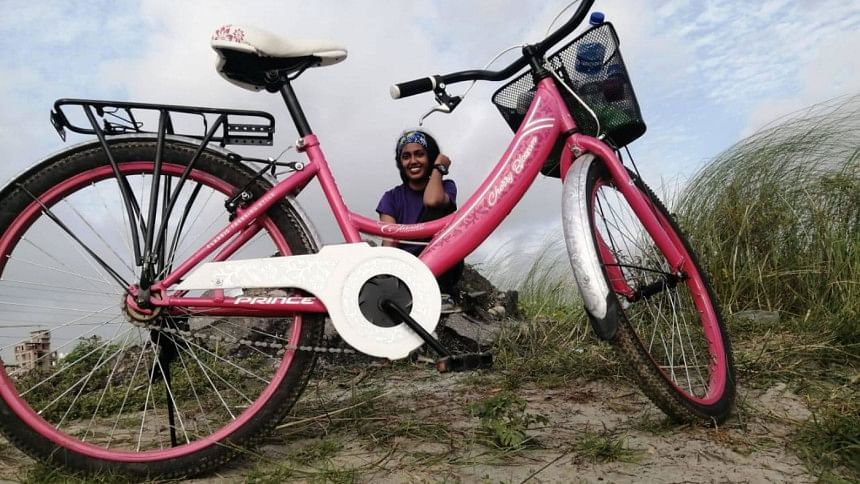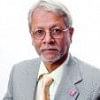Pedestrians first, pedal cyclists second, then the rest

What I am about to write will be of no use, least of all any consolation, to the family and friends, and yes admirers, of the flicker that was denied to sparkle. Because they cannot bring her back to conquer mountains with a smile, to pedal a bicycle to her heart's delight, or convey knowledge to her students with care.
A promise was muzzled, again you can say, on our road on the morning of August 7. A motor vehicle knocked her down most brutally at the capital's Lake Road, again you can say. A driver was most callous, again of course. Did the driver have a proper license? Again you can ask. Did the transgressing vehicle flee after the incident? You need not ask.
This, we have seen, has been the hallmark in our culture. Some drivers cannot remain normal in their seat. The sadism in them takes over their sensibilities, especially if they spot a woman on the road.
The inhumane hostility dwells in the mind of the city motorist as well as the truck driver doing the intercity. The chauvinism thrives among the literate in as much as the unread. The yearning is common to the rich and the have-nots. It's a male thing. Would the cyclist have lived, if she had been a man? The recklessness and speed which overtake our drivers make no sense at all. The bulk of the vehicles are manufactured abroad, perhaps Japan or Malaysia. None of these drivers have any credit for the velocity they can gain, even if the vehicle was homemade. And yet our drivers continue to rob lives in a murderous manner on our roads all over the country. Not being punished because of explicit protection is one big reason for their heroics.
Based on the merit of each case, drivers have to be punished. Saying that pedestrians and cyclists and van drivers are not careful has been used as a cover-up for too long. About four to five thousand people lose their lives on the road, twice the number are grievously injured, and both are the cause of the emotional and financial ruin of their respective families. They never recover. They are doomed to weep for life. Not the driver and his family though.
The number of deaths and the number of accidents remain inaccurate for lack of proper reporting and recording. According to one source, Nirapad Sarak Chai (We want safe roads), the number of deaths in road crashes in Bangladesh in 2019 was 5,227, compared to 4,439 people killed in 2018, whereas Bangladesh Jatri Kalyan Samity (passengers' welfare association) recorded 7,855 deaths in 2019 compared to 7,221 the year before. Most importantly though, the numbers are frightening, because every day about 20 people are being crushed in road accidents.
Nirapad Sarak Chai's prime mover, film actor Ilias Kanchan, who lost his wife in a road accident in 1993, reckons uneducated and unskilled drivers, vehicles with technical faults, weak traffic management and implementation of traffic rules, lack of public awareness, uncontrolled speed of vehicles, faulty road construction, and lack of political will are the main causes behind road accidents. You cannot argue with that.
The speed limit within the city is usually 20-30 mph in most civilised countries. And, we are not. There is almost zero death within their city limits because even when the road ahead is absolutely barren, and at night when no one is watching except the CCTV cameras, or on a deserted road in the forests, no one is speeding. It's common sense. It saves lives.
In our cantonments, while uttering father-father, the bravest, the most reckless and the extremely lustful drivers are also abiding to a limit of 30-40 km per hour, maintained by the sentries. One wrong move, and the military policeman would seize the license of the driver, only to be collected from an office after a round of polite warning and fine, or both. The cantonment is inside Bangladesh.
In the city though, even without making any move, a driver's license may be seized. Bad luck! A smile may help him get it back, or not. "Fine" here means fine, as in bright and well. As they part their ways, the glum driver can be seen rearranging his ruffled papers, and the policeman returning to his job with glee.
Speed limits have to be strictly applied. Hefty fines have to be imposed. The seat-belt penalty works quite well. Our drivers must understand, appreciate and remember that an empty road is not a license to speed. It is an opportunity to enjoy one's driving, even if the person behind is assuming the one in front is an ass. Gadha sounds so much more real.
Safe driving lessons must start at primary schools. Children are the best educators of their parents. They can shame anyone with a terse observation. Early learning will stick with them for life. In the next generation, we may not need to count so many bodies on account of meaningless encounters. Road safety should be included in the social studies syllabus up to secondary level.
Radio and television programmes should highlight road safety and how to save lives, not in sombre talk shows, but in short jingles and clips that can draw the attention of the entire family. Together, the driver and his children can teach each other. A father will not fail his children in the lessons he himself imparted.
The point is again a matter of civilisation. In countries such as the USA, where, in many states, one can be immobile without a car, the dictum is "pedestrians first"; they have the right of way. In the UK, drivers have to maintain a distance of five feet from a cyclist. Our drivers have learnt to bulldoze pedestrians, and scare the daylight out of cyclists, and gotten away.
Then there are the social pests, who come up with this lame argument and that false logic after every accident; that the pedestrian was not looking, that the cyclist should not have been on the main road ittyadi. Any advocate for errant drivers should be socially, politically and legally reprimanded with two simple words, "Shut up". Okay three more, "Wipe that smile!"
Rest in peace, Reshma Nahar Ratna. Let your soul haunt them till they make the roads safe.
Dr Nizamuddin Ahmed is a practising Architect at BashaBari Ltd., a Commonwealth Scholar and a Fellow, a Baden-Powell Fellow Scout Leader, and a Major Donor Rotarian.

 For all latest news, follow The Daily Star's Google News channel.
For all latest news, follow The Daily Star's Google News channel. 



Comments